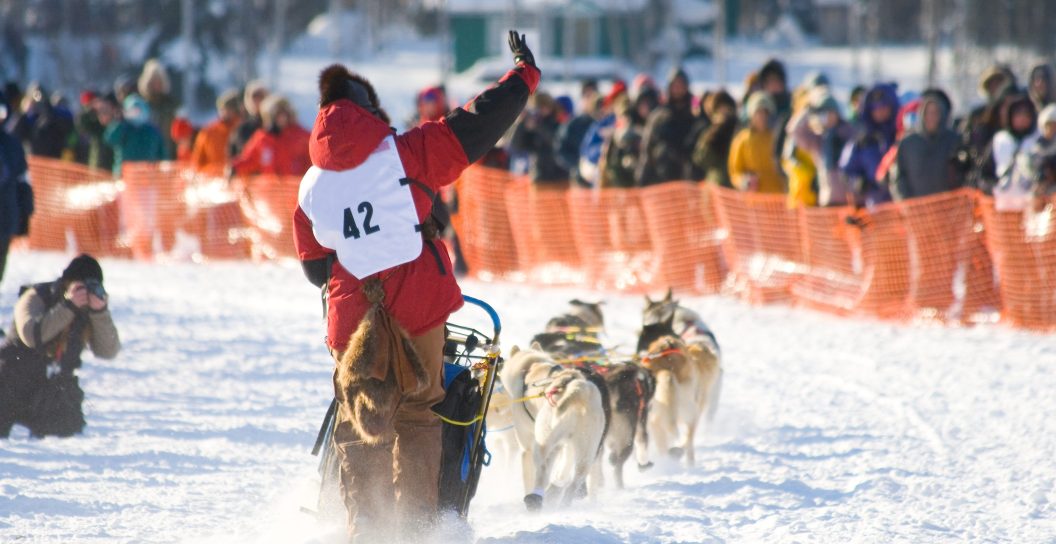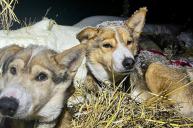The Iditarod, a 1,000-mile sled dog race across remote Alaska, is famous for its amazing sled-dog athletes and its tough, do-it-yourself mushers who spend over a week traversing harsh conditions for a chance at glory. It's usually cause for celebration every year in Alaska. Unfortunately, this year's Iditarod is quickly becoming infamous before it even begins.
The 2024 Iditarod is slated to have its ceremonial start on March 2. In the two weeks preceding the event, alarming allegations of sexual assault have surfaced to cast a pall over the race and the sport of sled dog racing in general.
The trouble began in mid-February when the race's governing body, the Iditarod Trail Committee (ITC), sent an email to all 2024 competitors saying that it had been informed of several accusations of violence against and abuse of women within the mushing community. "The ITC Board cannot tolerate such conduct by anyone affiliated with the Iditarod," they wrote.
Shortly after that email was sent, the committee held an emergency meeting and disqualified the 2023 rookie of the year, Eddie Burke Jr., on February 19. Burke has been facing felony and misdemeanor assault charges since May 2022, after his ex-girlfriend told police that he had strangled her to the point that she almost lost consciousness. Burke was arrested and released on bail, and for nearly two years, the case has remained pending in the court system. The ITC disqualified him for violating the race's personal conduct standard, which bars conduct that reflects poorly on the event and its sponsor; but the ITC's brief statement didn't specify whether the 2022 assault case prompted their decision.
Two days later, the State of Alaska dismissed the charges against Burke because his ex-girlfriend declined to participate in the case. On February 23—four days after his official disqualification—Burke was reinstated by the ITC as a 2024 Iditarod competitor. However, on February 26, Burke announced via Facebook that he will not be racing. According to the post, "After being reinstated, it has been a challenge to gather my team back together and prepare for the race."
While he was disqualified, Burke said he made agreements with six other mushers to lease out his dogs for them to use in the race. Burke decided to honor those agreements, rather than take part in the Iditarod himself after his reinstatement. "After tough consideration, I have made the decision to withdraw from this (year's) race and honor the agreements I have made with my fellow mushers [...] Traveling to Nome is what [my] team deserves, even if that means traveling the trail without me."
A Second Musher's Disqualification
But Burke's weren't the only troubles for the Iditarod. On February 22, the ITC disqualified a second musher, 2022 Iditarod champion Brent Sass, for being in violation of the same Rule 53 regarding misconduct, again with no further official explanation.
It seems that four months prior to the decision, board members of the Kuskokwim 300, another Alaska sled dog race, received a letter on behalf of women accusing Sass of sexual assault from an official at Planned Parenthood Alliance Advocates Alaska. According to Alaska's News Source, which obtained a copy of the letter, advocate Rose O'Hara-Jolley wrote that "over the past six years, I have been approached in my capacity as an advocate by many women from diverse backgrounds and across Alaska. I am writing on behalf of multiple survivors who wish to remain anonymous for their own physical and emotional safety."
She continued: "To our knowledge these assaults have taken place over the course of a decade, and the ones we've heard about likely represent only a fraction of the ones that have actually taken place. One theme rings true through all of these assaults. Access. Brent Sass has access to women in remote locations through mushing, guiding, and on his homestead. These women have asked us to come forward on their behalf in hopes of protecting women in the future."
Kuskokwim 300 race manager Paul Basil told Alaska's News Source that since they were first informed of allegations against Sass in the fall of 2023, they have been approached by several survivors and advocated with "additional first and secondhand accounts alleging acts of sexual, physical, and emotional abuse by Sass." Sass subsequently withdrew from the Kuskokwim 300, which was raced from January 26 to 29 this year.
One of the accusers stated that Sass had choked and raped her, according to Alaska Public Media. She said she didn't go to the police at the time because she depended on Sass for shelter at his remote dog kennel and worked for him. A second accuser told the media outlet that Sass hit and slapped her during sex without her consent, and raped her.
No legal actions have been made against Sass regarding these accusations.
Once these and other news outlets learned of the letter and began making inquiries to the ITC regarding it, Sass's disqualification from the Iditarod followed soon after.
Sass has proclaimed that the accusations are false and have been made up by people trying to ruin his reputation and his career. His Facebook post on Friday, February 23, has received over a thousand comments, many of them in support of Sass and taking issue with the fact that the ITC disqualified him (and Burke) when neither man had any convictions against them.
It's Not an Iditarod Problem, It's An Alaska Problem
While the sexual assault allegations and subsequent handling of them by the ITC is concerning, violence against women in Alaska is a serious issue. Alaska had the highest rate of rape in the United States in 2022, the year with the most recent data. It also has the fourth highest rate of violence against women, with over 43% of Alaskan women experiencing domestic violence, and has the highest homicide rate for women killed by men in the United States, and Alaska's sexual assault rate is four times the national average. Many of the victims are Alaska Native women, and much of the violence happens in remote areas of Alaska where the police are few and far between. Many sexual assault accusations in Alaska are never prosecuted, and this is no doubt truer in rural Alaska.
In a sport that has already had to deal with allegations of animal abuse from certain conservation groups, this wave of assault and abuse allegations against women is likely to take its toll. However, it could result in an important step forward in a state that is rife with abuse and sexual assault against women. While Burke and Sass are both innocent until proven guilty, what is certain is that Alaska needs to overhaul its law enforcement system and start taking the safety of Alaskan women more seriously.
READ MORE: How to Find Your Own Female Outdoor Group




